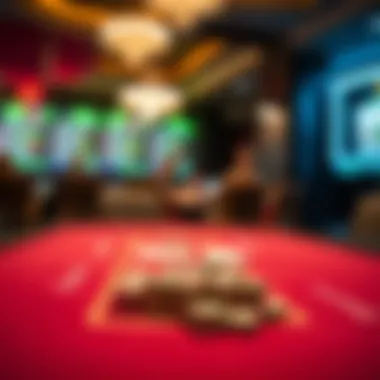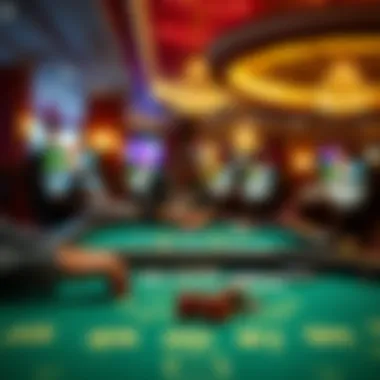Deep Dive into Blackjack House Rules and Strategies


Intro
In the world of casino gaming, blackjack often stands out as a favored choice, thanks to its blend of strategy and chance. Yet, many players jump into the game without taking the time to grasp its intricate house rules. The house rules can vary significantly from one casino to another or even across tables within the same establishment. This can mean the difference between a winning strategy and a losing one. From the number of decks in play to specific rules around splitting and doubling down, these details play a pivotal role in shaping gameplay.
Understanding the house rules isn't just for the high-rollers or professional players. Novices who are just dipping their toes into the gambling pool can create a solid foundation for their gameplay by familiarizing themselves with these nuances. In this article, we'll take a deep dive into the many facets of blackjack house rules, examining popular variations, and uncovering how they can affect your strategies and outcomes.
Blackjack is not merely a game of luck; it's a complex dance between chance and strategy, with every player wanting to come out on top. Therefore, being well-versed in the specific regulations that apply can enhance your experience and possibly even your wallet. Let’s unpack what that means.
The Essence of Blackjack
In the realm of gambling, blackjack stands out as a captivating blend of skill, strategy, and a dash of luck. To truly grasp the significance of house rules, it's essential to first delve into the essence of the game itself. Understanding blackjack is not just about playing cards; it’s about recognizing historical nuances and the ultimate objective behind each hand dealt.
Historical Context
Blackjack has a rich and varied history that spans centuries. The origins can be traced back to the 17th century, with variations appearing in French and Spanish gambling houses. The French version, known as 'Vingt-et-Un' (Twenty-One in English), laid the groundwork for what would later become blackjack. As the game evolved and crossed the Atlantic, it adapted to fit American gambling norms, transforming into the beloved version known today.
The game's name change occurred in the early 20th century. Casinos began offering a bonus payout for a black spade and a jack of spades, which led to the term 'blackjack.' This name became synonymous with the game itself, helping cement its popularity in the U.S. and beyond. Understanding this history offers insight into why specific rules and strategies developed over time, and it reveals how the game has adapted to meet players' preferences.
Objective of the Game
When you sit at a blackjack table, the main goal is straightforward: beat the dealer without exceeding 21. This sounds simple, but the layers of strategy beneath this objective make it anything but. Players must decide whether to take another card, stand, double down, or split pairs, all while keeping an eye on the dealer's visible card.
Moreover, the concept of pushing—a round where both the player and dealer tie—adds another layer of complexity. Players must carefully gauge their cards against the dealer's visible card, employing strategies that vary based on house rules. Each decision can shift the odds in one’s favor or against it.
The uniqueness of blackjack lies in its blend of chance and strategy. The choices made during play can significantly influence the outcome, making each hand a thrilling blend of psychological tactics and probabilities.
House Rules Defined
In the realm of blackjack, house rules play a pivotal role that extends far beyond mere guidelines. These rules dictate not only how the game is played but also influence the strategies that players employ. Understanding these house rules can be likened to knowing the lay of the land before embarking on a journey; it sets the expectations and, more importantly, zones in on potential outcomes. The significance is clear: a player who grasps the intricacies of house rules is better equipped to navigate the game with skill and confidence.
Understanding House Edge
The house edge is a concept every gambler should be keenly aware of. At its core, it refers to the statistical advantage that casinos hold over players. For blackjack, the house edge can vary significantly depending on the specific rules enforced at the table. For instance, if the dealer stands on a soft seventeen, it often translates to a higher house edge compared to situations where the dealer hits on it.
The house edge can be computed using simple mathematics, but its implications run deep. By paying attention to these edge details, players can alter their game strategies accordingly. Some common factors influencing house edges include:
- Deck number: Fewer decks can often reduce the house edge, benefiting skilled players.
- Player options: Rules like allowing players to double down or surrender change the edge dynamics significantly.
- Insurance offers: Frequently discouraged by experts, taking insurance can raise the house edge for the player.
Understanding these elements gives players the upper hand, transforming a seemingly straightforward game into a tactical battlefield where decisions have substantial consequences.
Variability Among Casinos
One of the fascinating aspects of blackjack is that no two casinos offer the exact same experience. This variability applies as much to the physical layout of a casino as to the particular house rules enforced at various tables. For example, a casino in Las Vegas may have different rules than one located in Atlantic City.
Some key considerations regarding variability include:


- Rule Adjustments: Changes such as continuous shuffling machines or specific payout structures for blackjack itself can shift the player’s strategy.
- Game Type Variation: Variations like Spanish 21 or Blackjack Switch might not follow traditional rules, introducing unique twists and house edge adjustments.
- Table Limits: Casinos manipulate betting limits to attract different crowds, which in turn can affect gameplay and strategy.
Players must do their homework before seating at any blackjack table. Checking out the specific house rules can mean the difference between walking away with winnings and spending a night nursing losses. As the old saying goes, sometimes the devil is in the details; in the case of blackjack, it is those details that can either make or break a player's experience.
"In poker, there are a lot of opportunities to win based on your skill; in blackjack, understanding the house rules might be your best ally."
By grasping the nuances of blackjack house rules, players can develop not just a better understanding but also a stronger strategic approach, essential for succeeding in one of the most popular card games in the world.
Key House Rules in Blackjack
In the grand tapestry of blackjack, house rules serve as the threads that dictate how the game is played. Understanding these rules is not merely an academic exercise; they have real implications on how a player approaches each hand. These house rules can vary significantly between casinos, and they can influence the house edge, a fundamental concept in gambling that represents the casino's inherent advantage. A well-versed player can leverage this knowledge to improve their strategy, making understanding house rules a crucial aspect of the blackjack experience.
Dealer Standing on Soft Seventeen
One of the more debated house rules in blackjack is whether the dealer stands on a soft seventeen or hits. A soft seventeen arises when the dealer has an Ace counted as eleven and a six, tableau contributing to a total of seventeen. If a casino has a rule stating that the dealer must hit on a soft seventeen, the house edge increases marginally, up to about 0.2%. Conversely, if the dealer is mandated to stand, that gives the player a slightly better shot at winning. This subtle difference in rules means players must adapt their strategy depending on the conditions of the game.
"Understanding how the dealer plays can be just as important as one’s own hand."
Doubling Down Rules
Doubling down is a pivotal tactic that can significantly tilt the odds in favor of the player when executed correctly. Standard rules often allow doubling down after the initial two-card hand, but variations can exist across different venues. Certain casinos may permit doubling down on any two-card total, while others draw the line at specific totals like 9, 10, or 11. Additionally, some establishments might allow doubling down after splitting pairs. Knowing these rules helps players determine when to invest more in a hand, thereby affecting strategies and potentially improving winnings.
Splitting Pairs Variations
Splitting pairs is another critical maneuver in blackjack, allowing players to separate two cards of the same value into two distinct hands. The rules regarding this can be diverse. Some casinos limit splits to a few times, while others may impose restrictions on specific pairs or require that players always hit after splitting aces. This knowledge can direct players in how they approach their hands.
- Common Considerations when Splitting:
- Aces can often only receive one additional card after splitting.
- Some venues offer the option to re-split if further pairs are drawn.
- Players should be mindful of the likelihood of improving each hand post-split.
Surrender Options
The surrender option allows players to forfeit their hand and reclaim half their bet. Understanding when to surrender can be a potent strategy, particularly if the dealer has a strong upcard. Some casinos allow early surrender which can be more favorable, whereas others might only offer late surrender options. Players need to weigh the potential outcomes of each hand against the risk of a total loss. The availability of surrender rules can change the dynamics of the game significantly, providing players with more choice in their strategic approach.
Impact of House Rules on Strategy
The impact of house rules on strategy cannot be overstated when it comes to blackjack. These rules serve as the foundation for how the game is played, influencing everything from player decisions to the overall game pace. Understanding the nuances of house rules is essential for anyone looking to maximize their chances of success at the table. Various aspects, such as when a dealer must hit or stand, the availability of surrender options, and the nuances of doubling down can greatly affect optimal gameplay strategies and decisions.
Adjusting Basic Strategy
The basic strategy in blackjack is built upon probabilities—the mathematical ways outcomes unfold. However, adjusting this strategy based on the house rules can dramatically alter a player's edge. For instance, if a casino allows players to double down on any two cards, not just certain combinations, you can increase your potential winnings significantly. Conversely, if the dealer is required to stand on a soft seventeen, this knowledge forces players to reconsider when to aggressively hit or stand.
- Consider the following factors when adjusting your basic strategy:
- Doubling Down: Know whether the house permits doubling after splitting, as this impacts the odds considerably.
- Surrendering: The ability to surrender your hand can change your strategy entirely, offering a safer option when you’re in a tough spot.
- Hit or Stand Policies: Be aware of when the dealer must hit or stand, as this information affects your likelihood of winning the round.
By keeping these adjustments in mind, players can shift their strategies effectively, increasing their long-term success in the game. It's not just about the cards you're dealt; it's about how you play them in light of the house rules.


Card Counting Considerations
Card counting, a technique often romanticized in movies and literature, hinges on the understanding of remaining deck composition. House rules can significantly impact the efficacy of card counting techniques. For example, if a casino utilizes many decks in a shoe and has strict policies on reshuffling, it can make traditional card counting considerably less effective.
When counting cards, players must be mindful of:
- Deck Penetration: This refers to how deep the dealer deals into the deck before reshuffling. The deeper the penetration, the more effective your counts will be.
- Variation in Rule Sets: Some rules favor the player, like allowing a player to double down on any two cards, while others might oppose them. Knowing the advantage this gives can alter your counting strategy.
- Counter Bias: Mix up your counting system based on house rules. If you're frequenting a casino that doesn’t let players split Aces more than once, it could require a different counting approach.
Incorporating these considerations into your overall strategy not only sharpens your competitive edge but also enhances your understanding of the game, leading to more informed decisions at the blackjack table. Remember, knowing when to adjust your play style is just as crucial as knowing how to play the cards you hold.
Online vs. Live Casino Rules
In the realm of blackjack, the medium through which the game is played can greatly dictate not just the experience, but also the strategic approach one should take. Whether you're sitting at a physical table in a bustling casino or logged in to a virtual platform, the rules and nuances differ in ways that can impact your play. Let’s take a closer look at the significance of these distinctions, particularly in how they affect both the player and the strategies employed.
Differences in Game Play
The gameplay at online casinos contrasts quite sharply from that at brick-and-mortar establishments.
Interaction is one standout difference. In live casinos, players enjoy a sense of community, engaging with dealers and fellow gamblers face-to-face. This dynamic adds an element of excitement–the atmosphere crackling with the anticipation of what's to come. On the flip side, online platforms often feature live dealer games which utilize camera feeds to simulate a similar environment, yet the social aspect isn’t quite the same. Players might find themselves less inclined to converse, often preferring to focus solely on the cards in front of them.
Pacing is another telltale difference. Traditional casinos typically have a faster pace; dealers manage the flow efficiently with practiced ease. Players quickly take turns making decisions, which can heat up the adrenaline for those who thrive under pressure. Meanwhile, online games allow players to set their own tempo. They can take their time considering their next move, or activate autoplay features, potentially leading to a more relaxed gaming approach.
Gameplay functionalities also vary. Online platforms tend to offer a wider array of game variants and side bets, enticing players with low stakes or even free options to engage in practice. Live settings may be more limited, generally sticking to common variants like Classic and European Blackjack with fewer flashy side bets. Players must navigate these choices wisely, as the availability of specific variants can impact one's strategy considerably.
To sum up, understanding these gameplay differences can aid players in adjusting their mindset as well as their blackjack strategies, recalibrating to their preferred method of play whether live or online.
House Edge in Virtual Environments
When it comes to the house edge, distinctions can also be pronounced between online casinos and live venues. The house edge is fundamentally what gives the casino its advantage over players, but how it manifests can vary significantly across these platforms.
In live casinos, the house edge often incorporates dealer rules and game variations that might be more predictable. For example, some casinos implement rules that favor the house, like hitting soft seventeen. These can translate into a higher overall edge against players. However, the social aspect may offset that slightly for players who enjoy the experience, enticing them to take risks they wouldn’t normally consider.
Contrarily, online blackjack games, especially those operated by reputable developers, frequently offer a lower house edge. Online platforms can afford to have smaller margins due to reduced operational costs, such as lesser staffing needs and lower overhead expenses–contributing to more favorable game rules. Furthermore, online sites often display return-to-player percentages, so players can make informed choices based on potential expected returns.
However, it is crucial to note that despite the seemingly better odds with online games, players must remain vigilant regarding the site’s legitimacy. Some unregulated or unsanctioned operators could offer skewed rules that might not truly benefit the player. Always opt for fully licensed and regulated online casinos to ensure fair play.
The divergence between these two environments highlights the need for adaptability—successful blackjack players will find ways to thrive in both the virtual and physical worlds of the game.
Regulatory Framework
Understanding the regulatory framework surrounding blackjack is crucial for players and industry stakeholders alike. A robust understanding of the laws that govern gambling ensures that participants know their rights, the legitimacy of the games they engage in, and how those games operate within legal boundaries. These regulations help protect players, maintain fairness in games, and uphold the integrity of the gambling industry.
Gambling Legislation Overview
Gambling laws vary significantly across different regions, and it's essential for anyone involved in blackjack—players, developers, and marketers—to grasp these differences. For instance, some jurisdictions allow online gambling, while others outright ban it. The laws can dictate everything from age limits and tax implications to how a casino must operate to retain its license. Here are some key points regarding gambling legislation:
- Legal Age: Most places require players to be at least 18 or 21 to gamble, depending on local laws. Not adhering to these regulations can lead to serious consequences for both the player and the establishment.
- Game Fairness: Regulations often stipulate how blackjack games must be conducted to ensure fairness. This can include oversight on how games are dealt or how decks are managed.
- Tax Obligations: Revenues generated from gambling generally come with tax requirements. Many jurisdictions collect taxes on winnings as well as revenue from casinos, impacting how the games are structured long-term.


This maze of rules can seem daunting, but it is crucial for maintaining a safe and enjoyable gaming environment.
Licensing and Compliance
Licensing is a vital aspect of the gambling industry that ensures casinos operate within the legal framework established by regulatory bodies. Players should think of a casino’s license as a badge of credibility. An operation without a valid license can cheat players and potentially vanish overnight without recourse for those who've placed their bets. Here are several points to consider about licensing and compliance:
- Operational Standards: Licensed establishments must comply with stringent standards that govern everything from game play to player payouts. Non-compliance can lead to penalties or even the loss of their operating license.
- Consumer Protection: Licensing ensures that player rights are preserved. For instance, a regulatory body may require casinos to provide timely payouts and report their financial results transparently.
- Ongoing Monitoring: Regulatory compliance is not a one-and-done deal. Licensed casinos are often subjected to regular audits and reviews to ensure they maintain compliance with laws and standards. This continuous monitoring helps bolster player trust.
"Knowledge of your rights and the laws surrounding them isn’t just beneficial; it’s necessary when money’s on the line."
For more information, you can check resources such as Wikipedia or National Council on Problem Gambling.
Common Myths about House Rules
Understanding the common myths surrounding house rules in blackjack is essential for players aiming to enhance their gaming experience. Often, misconceptions can lead players to make poor decisions at the table, which may cost them both in terms of strategy and money. This section aims to dissect some of the most prevalent myths, contrasting them with the reality of how these rules operate and affect gameplay.
Myth vs. Reality in Game Outcomes
One prevailing myth is that house rules are designed purely to benefit the casino, to the detriment of the player. While it's true that casinos implement rules that ensure they maintain a profit, this notion oversimplifies the dynamics at play. House rules are not inherently unfair; rather, they create a framework within which the game operates. An informed player can leverage this framework to their advantage.
For instance, consider the myth that a particular version of blackjack always results in worse outcomes due to unfavorable rules. In fact, it often comes down to the player's strategy. A variation with a higher house edge in certain scenarios might be outperformed by a lower house edge game if the player adapts their strategy accordingly. The critical understanding here is:
- House rules vary, and players need to know the specific rules of the game they are playing.
- Adaptation is key; strategies should be tailored to rule variations.
- Understanding odds associated with specific rules can significantly influence outcomes.
As players navigate through different house rules, recognizing that they can adjust their approach is paramount. While the house has an edge, it is not insurmountable, and players with knowledge can turn the tables.
Player vs. Dealer Perceptions
When it comes to perceptions, another myth is that players believe the dealer always has the upper hand. This belief stems from the idea that dealers are professionals with extensive training, making them almost unbeatable. However, this perspective overlooks the skill and strategy that players can bring to the table.
Players often feel they are at a disadvantage, but the reality is that effective strategies can level the playing field. Here are notable points to consider:
- Players are not helpless. Knowledge of house rules and proper strategy can empower players.
- Decision-making significantly influences outcomes since players act before the dealer within the round.
- Psychological edge: Many dealers face pressure from the house, which can sometimes work to the player’s advantage.
It's essential for both novice gamblers and seasoned bettors to understand that blackjack is as much a game of skill as it is of chance. By challenging their perceptions, players can cultivate better strategies, possibly even gaining the upper hand against the dealer.
Culmination
Understanding the intricacies of blackjack house rules is not just a minor detail—it's fundamental to successful gameplay. The variations in these rules can significantly shift the balance of the game in favor of the house or the player, depending on how well one understands them. This article has endeavored to elucidate the various aspects of house rules and their subsequent impact on strategy, and it is crucial for both novice and experienced players to appreciate these elements.
A core takeaway from this discussion is that informed play is paramount. It allows players to adapt their strategies more effectively, optimizing their chances of winning by leveraging their understanding of different rules and regulations specific to each casino setting.
The Importance of Informed Play
Informed play means being acutely aware of how each house rule affects your chances of coming out ahead. Knowledge of whether the dealer stands on soft seventeen, or the nuances of surrender options, can be the difference between victory and loss. Here are a few reasons why this is crucial:
- Strategic Adaptation: Understanding the house rules empowers players to adjust their strategies accordingly. When you know that a casino mandates dealer hits on soft seventeen, you can modify your approach with greater precision.
- Risk Management: Being aware of rules such as splitting pairs or doubling down can significantly influence the risk-reward ratio of your bets. With this knowledge, players can make informed decisions, potentially lowering the house edge.
- Maximizing Winnings: By mastering the house rules, players can capitalize on favorable conditions whenever possible and mitigate unfavorable ones. This careful balancing act is essential for long-term success at the blackjack table.
- Dispel Myths: Informed players are less likely to fall for common misconceptions about the game. Their understanding of the real implications of house rules equips them to navigate gameplay more effectively.
"Knowledge is power" - this expression rings true, especially in gambling where every decision is based on calculated risks.
When looking at the broader scope of blackjack, it's clear that the game's essence hinges on how players interact with these house rules. A deep understanding not only enhances the gaming experience but also prepares players to handle the ups and downs of blackjack more gracefully.
In summary, the significance of informed play cannot be understated. By comprehending how house rules vary from one setting to another, players put themselves in the best position to enjoy the game while increasing their odds of coming away winners. Consider diving further into resources like Wikipedia, Britannica, or forums like Reddit for counterpoints, discussions, and varied strategies that keep your knowledge fresh and actionable.















